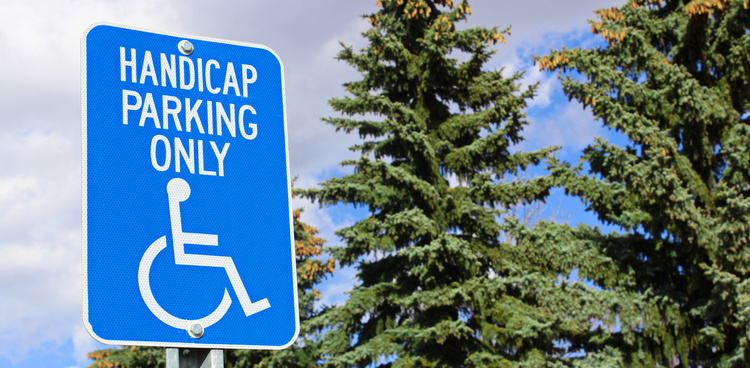
Poor Vision & Getting a DMV Handicap Parking Permit
Are you struggling with poor vision and finding it difficult to navigate through busy lots or even just getting in and out of your car? You're not alone. Millions of people worldwide suffer from poor vision, making driving a challenge. However, did you know that you may be eligible for a DMV accessible permit? In this comprehensive guide, we'll cover everything you need to know about getting a DMV handicap parking permit with poor vision.
The Importance of Handicap Parking Permits
People with disabilities or medical conditions such as poor vision face many challenges in their daily lives. One of the biggest challenges is mobility, especially in crowded areas such as parking lots. Fortunately, accessible permits can help alleviate some of these challenges by providing designated spaces that are closer to entrances and exits. This can make it easier for individuals with poor vision to get around and perform daily tasks.

What is a DMV Handicap Parking Permit?
A DMV accessible parking permit is a special permit issued by the Department of Motor Vehicles (DMV) to individuals with disabilities or medical conditions that limit their mobility. The permit allows these individuals to park in designated disabled spaces, which are typically located closer to entrances and exits.
Who is Eligible for a DMV accessible Parking Permit?
Individuals with poor vision may be eligible for a DMV disabled permit if they meet certain criteria. These criteria may vary from state to state, but generally include:
- Vision impairment that limits the ability to walk safely for a reasonable distance
- Inability to walk without the use of an assistive device such as a cane, crutches, or a wheelchair
- Lung disease or other medical conditions that limit the ability to walk
- Cardiovascular disease or other medical conditions that limit the ability to walk
- Arthritis or other medical conditions that limit the ability to walk
How to Apply for a DMV disabled Parking placard
The process for applying for a DMV disabled placard may vary depending on your state. However, here are some general steps you can take to apply:
- Obtain a medical certification form from your physician, which will need to be completed and signed by your physician.
- Complete the DMV disabled placard application form, which can typically be found on your state's DMV website.
- Submit the completed medical certification form and the DMV disabled placard application form to your state's DMV office.
- Wait for approval from the DMV, which may take several weeks.
How Long is a DMV Handicap placard Valid?
The length of time a DMV disabled permit is valid may vary depending on your state. Generally, placards are valid for a period of two to four years. However, it's important to note that the expiration date of your placard may be different from the expiration date of your driver's license.
Can You Renew a DMV disabled Permit?
Yes, you can typically renew your DMV disabled placard before it expires. However, you may need to provide updated medical certification forms to show that your condition still qualifies you for a sign.
Frequently Asked Questions (FAQs)
Q: Can I use my DMV accessible permit in other states?
A: Yes, you can use your DMV disabled placard in other states. However, it's important to note that the rules and regulations for disabled may vary from state to state.
Q: Can I lend my DMV accessible placard to someone else?
A: No, you cannot lend your DMV disabled permit to someone else. The placard is issued specifically to
you and is non-transferable. Violating this rule can result in fines or revocation of your tag.
Q: Can I still park in a handicap space if I don't have my DMV accessible placard with me?
A: No, you cannot park in a disabled space without displaying your DMV accessible placard . Doing so can result in fines or towing of your vehicle.
Q: What should I do if someone is parked in a handicap space without a placard?
A: If you see someone parked in a accessible space without a placard , you can report the violation to the authorities or parking lot management. It's important to note the vehicle's license plate number and any other relevant information to aid in the investigation.
Q: What if my DMV accessible placard is lost or stolen?
A: If your DMV disabled permit is lost or stolen, you should report it to the authorities and apply for a replacement. The process for obtaining a replacement may vary depending on your state.
Q: Can I use my DMV accessible parking placard if I'm not driving?
A: Yes, you can still use your DMV accessible placard if you're a passenger in a vehicle. However, the placard must be displayed and the vehicle must be parked in a designated accessible space.
Q: Can I still use my DMV accessible parking permit if I get a new vehicle?
A: Yes, you can still use your DMV accessible placard if you get a new vehicle. However, you must ensure that the placard is displayed in the new vehicle and that it's parked in a designated accessible space.
Poor Vision and Getting a DMV accessible Parking placard
Individuals with poor vision may find it difficult to navigate through busy parking lots or even just getting in and out of their car. However, a DMV accessible placard can help alleviate some of these challenges by providing designated spaces that are closer to entrances and exits. To be eligible for a DMV accessible parking placard with poor vision, you must have vision impairment that limits the ability to walk safely for a reasonable distance.
Conclusion
Poor vision can be a challenge, but a DMV handicap parking permit can help make mobility easier. By following the steps outlined in this guide, you can apply for and obtain a DMV handicap parking placard with poor vision. Remember to always display your placard when parked in a designated handicap parking space and to report any violations to the authorities or parking lot management.
.png)





